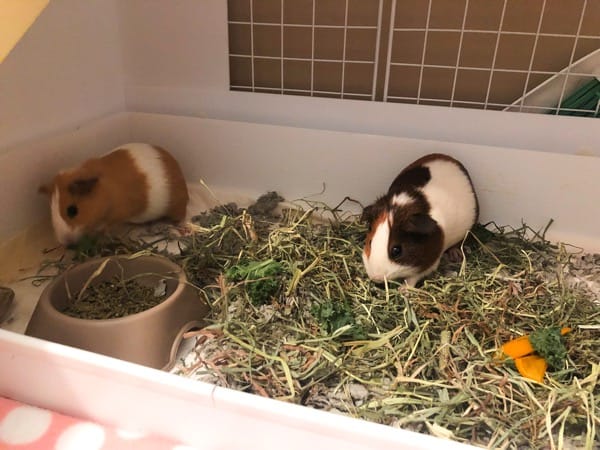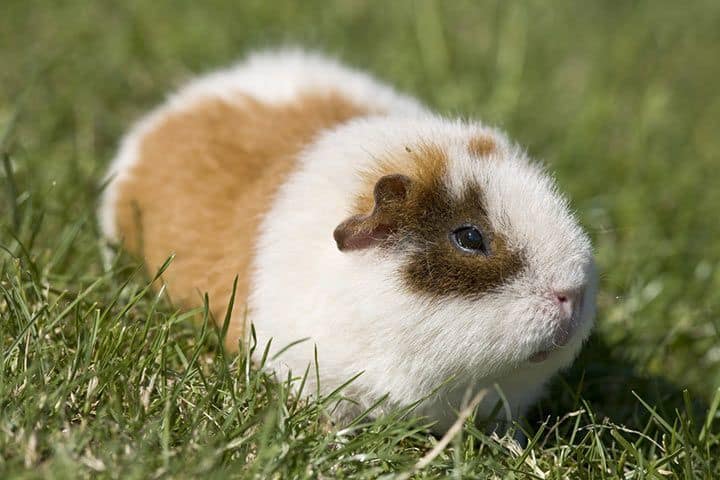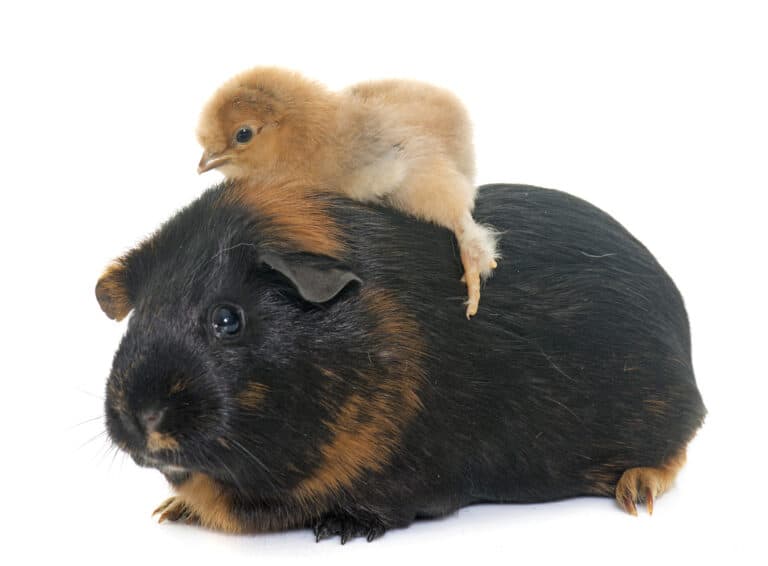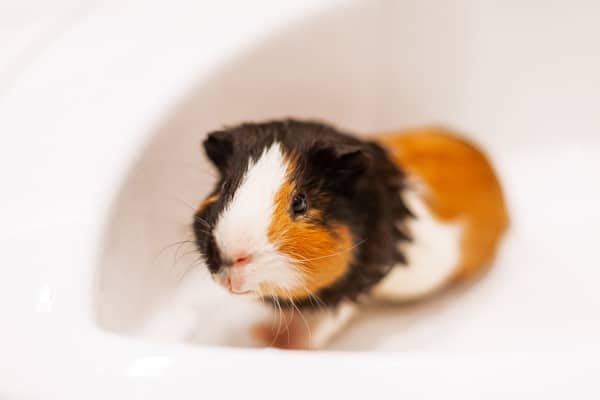Can You Overfeed a Guinea Pig
We know what you’re thinking: can you overfeed a guinea pig? Well, let us assure you, we’ve got all the facts. In this article, we’ll delve into the fascinating world of a guinea pig’s digestive system, uncovering their nutritional needs and the signs of overfeeding.
But that’s not all – we’ll also explore the health risks associated with overfeeding and provide you with valuable tips on proper feeding. So, join us as we unravel the mysteries of guinea pig nutrition and ensure our furry friends stay healthy and happy.
Key Takeaways
- Guinea pigs have a unique digestive system that requires a constant flow of fiber.
- Overfeeding can lead to obesity, heart disease, and respiratory difficulties.
- A balanced and appropriate diet, with hay as the main component, is crucial for the well-being of guinea pigs.
- Establishing a feeding schedule, measuring portion sizes, and providing the recommended proportions of hay, vegetables, and pellets are essential to prevent health risks.
The Digestive System of a Guinea Pig
Yes, our guinea pig’s digestive system is quite sensitive and requires a balanced diet. A guinea pig’s diet consists mainly of hay, fresh vegetables, and pellets. It is essential to provide the right amount of food to avoid overfeeding, as this can have a detrimental impact on their health. Overfeeding can lead to obesity, which can result in various health problems, including heart disease, joint issues, and respiratory difficulties.
Additionally, guinea pigs have a unique digestive system that requires a constant flow of fiber to maintain healthy gut function. Too much food, especially those high in carbohydrates, can disrupt their delicate digestive balance, leading to diarrhea, bloating, and even life-threatening conditions like gastrointestinal stasis. Therefore, it is crucial to provide a balanced and appropriate diet to ensure the well-being of our guinea pig.

Understanding the Nutritional Needs of Guinea Pigs
We need to be aware of the nutritional needs of our guinea pigs to ensure their health and well-being. Guinea pigs have specific food preferences that are important to consider when planning their diet. While they enjoy a variety of vegetables and fruits, it is crucial to remember that these should only make up a small portion of their overall diet.
The majority of a guinea pig’s diet should consist of hay. Hay is essential for their digestive system as it helps wear down their teeth and provides the necessary fiber for proper digestion. Timothy hay is a popular choice for guinea pigs due to its high fiber content.
Along with hay, guinea pigs also require a constant supply of fresh water and a specially formulated pellet food to ensure they receive all the necessary nutrients for their overall health. By understanding and meeting the nutritional needs of our guinea pigs, we can help them lead happy and healthy lives.
Signs of Overfeeding in Guinea Pigs
It’s important to be aware of the signs that indicate we may be overfeeding our guinea pigs. Overfeeding can have negative consequences on their health and weight management. Here are some signs to watch out for:
| Signs of Overfeeding in Guinea Pigs |
|---|
| Rapid weight gain |
| Obesity |
| Difficulty moving |
| Decreased activity level |
| Digestive issues |
If you notice your guinea pig rapidly gaining weight or becoming obese, it may be a sign of overfeeding. They may also have difficulty moving or become less active. Digestive issues such as diarrhea or bloating can also occur. It’s important to provide a balanced diet and monitor their food intake to prevent overfeeding.
Consult with a veterinarian for guidance on proper portion sizes and a suitable feeding schedule. By practicing good weight management, we can ensure our guinea pigs live healthy and happy lives.
Health Risks Associated With Overfeeding
Overfeeding can lead to various health risks, such as rapid weight gain, obesity, and digestive issues. When it comes to guinea pigs, the long term consequences of overfeeding can significantly impact their health. Guinea pigs are prone to obesity, which can lead to serious health problems like heart disease and joint issues.
Overfeeding can also cause digestive issues such as diarrhea and bloating. It is crucial to implement portion control in guinea pig feeding to prevent these health risks. Providing the appropriate amount of food based on their size, age, and activity level is essential.
Additionally, ensuring a balanced diet rich in hay, vegetables, and limited pellets is vital for their overall well-being. By practicing portion control, we can maintain the optimal health of our guinea pigs and prevent the long term consequences of overfeeding.
Tips for Proper Feeding and Avoiding Overfeeding
When it comes to feeding our guinea pigs, it’s important to establish a consistent feeding schedule to avoid overfeeding. We, as responsible guinea pig owners, must be aware of common feeding mistakes and ensure that we provide the recommended portion sizes for our furry companions.
One common mistake is overfeeding our guinea pigs with an abundance of food. Despite their small size, guinea pigs have specific dietary requirements and can easily become overweight if given too much food. It’s crucial to measure their daily portion sizes and avoid excessive treats or snacks.
Recommended portion sizes for guinea pigs include a balanced diet of hay, fresh vegetables, and pellets. Approximately 80% of their diet should consist of hay, which is essential for their dental health and digestion. Fresh vegetables, such as bell peppers and leafy greens, should make up about 15% of their diet. Finally, pellets should only be offered in small quantities, making up the remaining 5% of their diet.
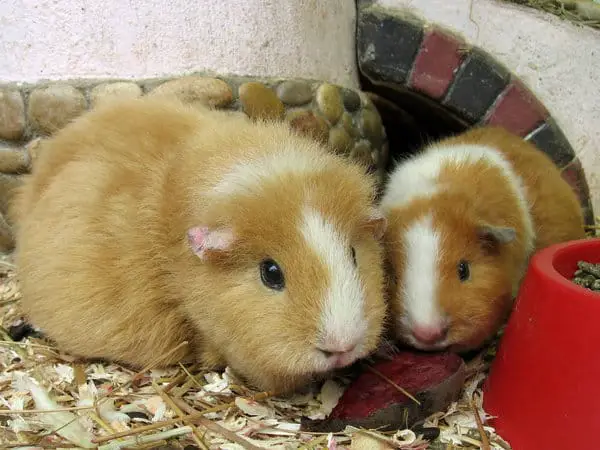
Conclusion
In conclusion, it is crucial to understand the nutritional needs of guinea pigs and avoid overfeeding them. Overfeeding can lead to various health risks, such as obesity and digestive problems. By following proper feeding guidelines and monitoring their intake, we can ensure the well-being of our furry friends.
Just as a delicate balance maintains the harmony in nature, a balanced diet for guinea pigs keeps them healthy and content like a perfectly blooming garden.

